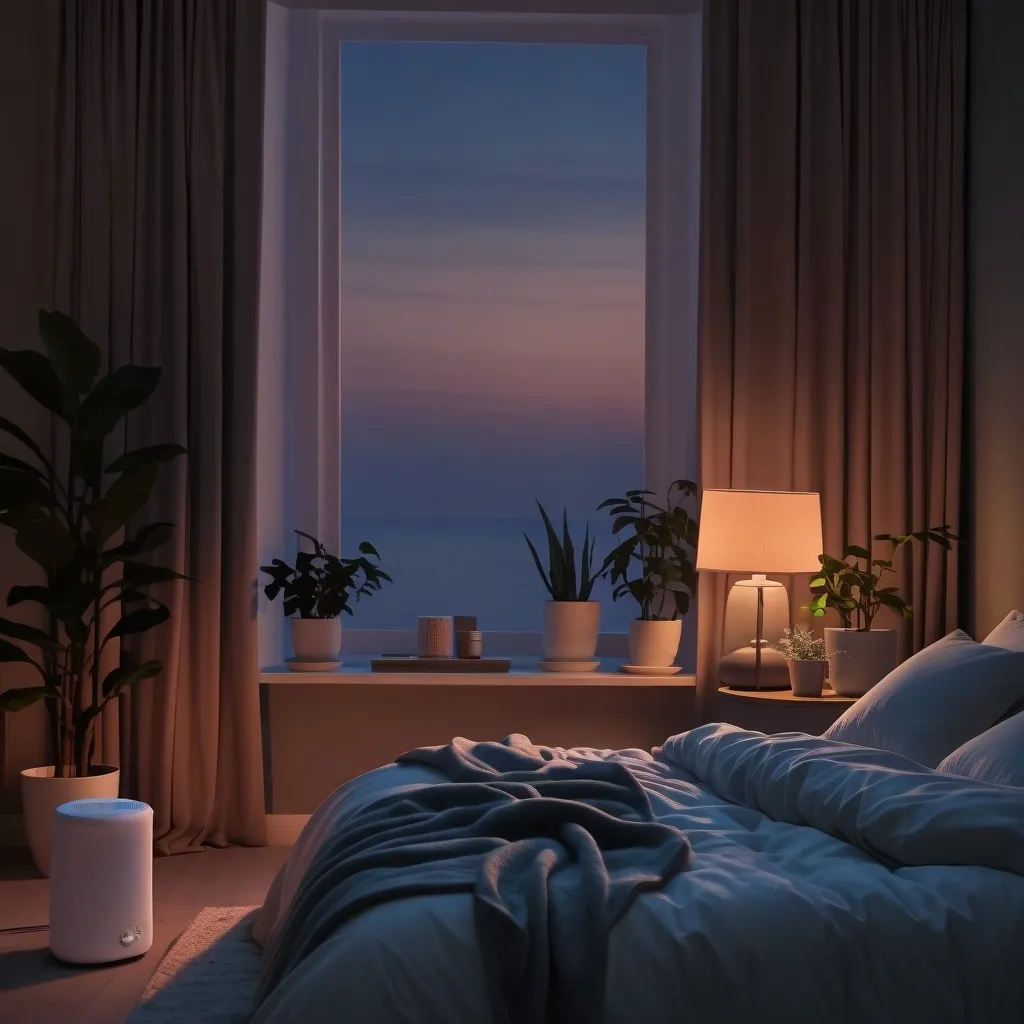Creating the perfect sleep environment is crucial for your overall well-being and productivity. It’s not just about comfort - it’s about setting the stage for deep, restful sleep that rejuvenates your body and mind.
Let’s talk about deep sleep for a sec. It’s like the VIP section of your sleep cycle. During this stage, your body goes into repair mode. Your heart rate slows down, your breathing deepens, and your brain waves enter a specific pattern that’s essential for memory consolidation and releasing growth hormones. It’s like hitting the reset button on your body and mind.
Now, onto the fun part - transforming your bedroom into a sleep sanctuary. First up, colors. You want your bedroom to feel like a warm hug, not a disco party. Think soft, soothing tones like dove grey, light coral, or pale gold. These colors can help calm your mind and prepare you for sleep.
Lighting is another biggie. Harsh overhead lights are a no-go. Instead, go for soft, warm lighting that you can easily dim. Table lamps or floor lamps with adjustable brightness are perfect. It’s all about creating that cozy, sleepy vibe.
Your bed is your sleep throne, so make it comfy! Invest in high-quality, breathable bedding. Cotton sheets with a high thread count feel amazing against your skin. And don’t skimp on pillows - having options with different thicknesses can help you find the perfect support for your head and neck.
Bringing a bit of nature into your bedroom can work wonders. A small potted plant or two can improve air quality and reduce stress. Plus, they look pretty cool. Just make sure you’re not allergic to any plants you bring in!
Now, let’s talk about blocking out the outside world. Blackout curtains are a game-changer if you’re sensitive to light. They can help your body produce melatonin, the sleep hormone, by keeping your room nice and dark. For noise, a white noise machine or even a fan can help drown out any disruptive sounds.
Temperature is super important too. Most people sleep best in a slightly cool room, around 65°F (18.3°C). But everyone’s different, so experiment to find what works for you. Maybe you need an extra blanket, or perhaps you sleep better with just a light sheet.
Keeping your bedroom clean and clutter-free is more important than you might think. A messy room can be stressful and harbor dust and allergens. Try to make tidying up a regular part of your routine. It doesn’t have to be a deep clean every day - just a quick tidy can make a big difference.
Now, here’s a tough one - avoiding electronics before bed. I know, I know, scrolling through your phone is tempting. But that blue light can really mess with your sleep. Try to power down at least an hour before bed. Instead, read a book, listen to some chill music, or do some light stretching.
Consistency is key when it comes to sleep. Try to go to bed and wake up at the same time every day, even on weekends. Your body loves routine, and this will help reinforce your natural sleep-wake cycle.
Exercise is great for sleep, but timing is important. A morning jog or afternoon workout can help you sleep better at night. Just avoid intense exercise too close to bedtime as it can leave you feeling wired.
Stress is a major sleep killer. If you find yourself lying in bed worrying, try jotting down your concerns in a journal. Getting them out of your head and onto paper can help calm your mind. Some people find meditation or deep breathing exercises helpful too.
Your bedroom should be a sleep sanctuary, not a multipurpose room. Try to keep work, entertainment, and other activities out of the bedroom. Your brain should associate your bedroom with sleep and relaxation, not stress or stimulation.
Remember, everyone’s different. What works for your friend might not work for you. It’s all about experimenting and finding what helps you get the best sleep possible. Maybe you sleep better with a slightly warmer room, or perhaps you need complete silence to drift off. The key is to pay attention to what makes you feel relaxed and sleepy.
Creating the perfect sleep environment isn’t just about tonight’s sleep - it’s an investment in your long-term health and happiness. Good sleep can improve your mood, boost your immune system, help you maintain a healthy weight, and even reduce your risk of certain diseases.
So, take some time to assess your current sleep setup. What’s working? What could be improved? Maybe you need to invest in some new pillows, or perhaps it’s time to declutter your bedside table. Small changes can make a big difference.
And don’t forget about the power of pre-sleep rituals. Developing a consistent bedtime routine can signal to your body that it’s time to wind down. This could be as simple as having a cup of herbal tea, doing some gentle stretches, or reading a few pages of a book.
If you’re a shift worker or have an irregular schedule, creating a good sleep environment is even more crucial. Blackout curtains and white noise machines can be especially helpful in these situations. And don’t be afraid to communicate with your household about your sleep needs - maybe you need some quiet time in the afternoon for a nap.
For those who share a bed with a partner, it’s important to find compromises that work for both of you. Maybe one of you needs complete darkness while the other likes a night light. Or perhaps one person runs hot while the other gets cold easily. Open communication and a willingness to experiment can help you find solutions that work for both of you.
And let’s not forget about the impact of what we consume before bed. Caffeine, alcohol, and heavy meals close to bedtime can all disrupt sleep. Try to cut off caffeine in the afternoon, limit alcohol, and have your last big meal a few hours before bed.
If you’re someone who tends to wake up in the middle of the night, don’t stress about it too much. It’s actually quite normal to have brief periods of wakefulness during the night. If you find yourself awake for more than 15-20 minutes, though, it might be helpful to get up and do something relaxing until you feel sleepy again.
For those who struggle with racing thoughts at bedtime, keeping a notepad by your bed can be helpful. Jot down any thoughts or to-do items that pop into your head. This can help clear your mind and allow you to relax into sleep.
Remember, creating the perfect sleep environment is a process. It might take some time and tweaking to get it just right. But the payoff - better sleep and improved overall health - is totally worth it.
So, here’s to sweet dreams and rejuvenating sleep. Your future well-rested self will thank you for the effort you put in now. Sleep tight!






